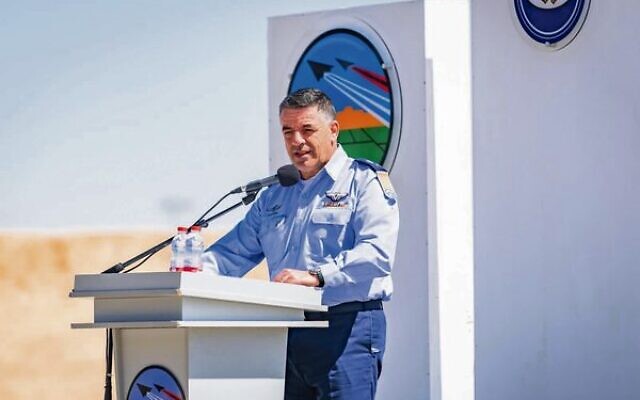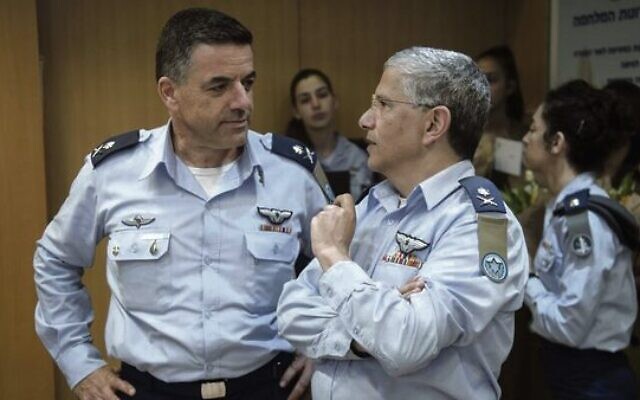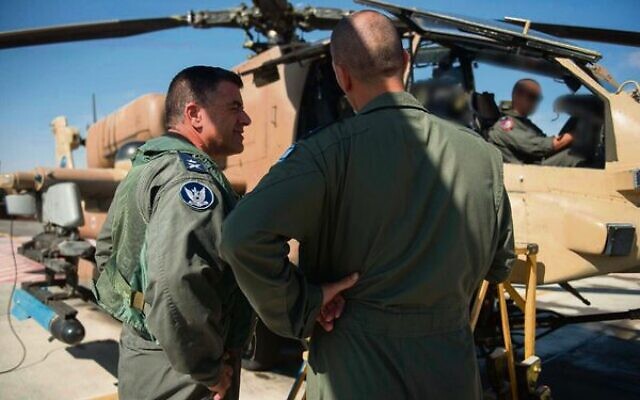Did you always want to be a pilot?
When I was a child, I planned to be part of the special forces of the IDF like my father. I never dreamed to be a pilot. But once I joined the IDF, the air force chose me for the flight academy. And then once I started my flights, I loved it.
I felt that I’m doing something very important for our nation, I felt that it’s also important for me.
I really love it and let’s say it’s become part of my life and part of my family.
What do you love about flying?
To be a pilot, especially a combat pilot, it makes you feel that you are doing something that you can never do in other missions. You can stretch your capabilities to the limits. And by that, you become a better person with better capabilities.
But to fly above Israel, to look all around the state, to fly low altitude, and to learn the terrain, to do an operational mission, [you] feel that you’re supporting the Israeli security. The meaning of flying as a military pilot, the way you fly, the capabilities that you get … the feeling is that you’re doing something that is above and beyond.
It’s like you feel like you’re in the Olympic Games that you achieve a medal every flight.

You oversaw the mission to destroy Syria’s nuclear reactor.
I was the main planner as the head of the operational department. Once our intelligence described what they found in Syria in early 2007 – it was only half a year after the Second Lebanon War – we understood that we needed to be prepared to destroy this target and to be prepared for war. Because we understood that once we attack this very meaningful target in Syria, the Syrian president may declare war.
So for six months we prepared the Air Force for this mission and we prepared for a war, without explaining why we were doing it. It was a top-secret procedure. So it was quite complicated to explain to the people why we are planning the Air Force for war after six months from the Second Lebanon War. So we described it that we are preparing the Air Force for war against Syria as part of the lessons that we learned from the Second Lebanon War.
And it was a very, very intensive period of time in my career. Because a lot of responsibility [was on] my shoulders. And once the government of Israel decided to attack this nuclear reactor, we felt at the time that we prepared ourselves and prepared the squadron the best we could.
But to fly above Israel, to look all around the state, to fly low altitude, and to learn the terrain, to do an operational mission, [you] feel that you’re supporting the Israeli security.
And I’m happy that they did it by plan. And they destroyed the Syrian nuclear reactor by plan. And the Syrian president took a decision not to start a war against Israel, because he knew that the Israeli Air Force and the Israel Defence Forces were well trained and well prepared.
And I think that as a planner, it’s a historic mission. It’s a once in a lifetime. And let’s imagine what might happen if in Syria today they might get nuclear capabilities, the Middle East might be completely different, so I’m very happy and proud that the government of Israel decided to do it and that the Air Force pilots did the mission in the best way.
What is it like being at the table for life-and-death security decisions?
I can tell you that in my second week as an Air Force commander, I sat with the Prime Minister and chief of the IDF together about the high-risk mission in Syria and the Prime Minister asked the chief of the IDF, what do you think, should we do it or not?
And then General [Gadi] Eisenkot answered “let Norkin answer this question”. And I told the Prime Minister that we can do it and the Air Force is ready. And at that time, two weeks after I got to my position, I felt that this is the moment that I am the Air Force commander, and by my answer, the Prime Minister, the government is going to take the decision.
Since then, it’s happened many times. And in Israel, it’s a very small nation with a very small airspace. The Air Force has got a lot of responsibility and the Air Force commander is in charge for the airspace and also for the air defence systems, the Iron Dome, David’s Sling, Arrow. So it’s 365 days a year that the national security is on your shoulders.

Photos: Israel Defence Forces
What is the most dangerous mission you’ve been involved in and why?
There were a lot of missions that were dangerous, first of all to fly low-altitude at night, long-distance missions and quite high-risk flights.
But I got some flights that I still remember because of the malfunction of my aero-plane. And at that time I thought that I maybe need to eject myself from the cockpit. And there were some, let’s say, combat missions over the enemy territory, that from time to time they launched toward us anti-air AAA bullets.
And, of course, the most long distance mission that I did, as F-15 squadron commander was to bring some intelligence before the IDF about the Karine A, the ship that tried to smuggle a lot of weapons to the Palestinians in the year 2001. We brought the intelligence from the Sea of Yemen, it’s a very long distance flight for us from Israel to Yemen. And at the end, the special forces of the Navy stopped this ship and we avoided a huge, huge problem for the Israel Defence Forces.
How have Israel’s security challenges changed over the years?
When I joined the Air Force, it was after the peace agreement with Egypt and less than 10 years later, Israel signed with Jordan a peace agreement.
So as a young pilot, the main enemy for us was the Syrian Air Force. But since then, in the next 20 years, the Middle East completely changed.
Iraq is not the same Iraq, there is no state today like it was, Libya, Yemen, there is a civil war in Yemen, Sudan divided to two states.
And today, we need to be able to secure Israel from non-state terror organisations like Hezbollah, Hamas, Islamic Jihad, ISIS, and of course the Iranian forces in the Middle East that try to do a lot of negative activities against Israel. So the spectrum of threats today is much wider.
It’s 365 days a year that the national security is on your shoulders.
Those terror organisations have got capabilities that are much bigger than military capabilities, for example, Hezbollah has tens of thousands of missiles and rockets and suicide drones it can launch towards Israel. Hamas has got tens of thousands.
So the Middle East generally changed. The threats changed, and the Air Force today needs to be able to defend Israel against a much wider spectrum of threats. And we need to be able to do more missions with the same amount of aeroplanes. And the main challenge is for which scenario we should prepare our forces – for the Gaza scenario, the Lebanon scenario, the Iranian scenario, with always limited resources. This is the main challenge.

Describe the challenges of Iran proxies operating on Israel’s borders and what can Israel do?
The Iranian threat you can divide into three sections. The nuclear threat, which is number one. The Iranian ballistic missiles, that threat is against Israel, the Middle East nations and I think also Europe. And, of course, the Iranian proxies threaten Israel every day because the Iranians support terror organisations, they smuggle weapons, weapons and military capabilities all over the Middle East.
And in 2015, the Israeli government took a decision that we cannot accept any Iranian capabilities near our border, especially in Syria. No Iranian bases, no Iranian airports, UAVs, air defence systems, radars, drones, nothing.
As a young child that grew up on a farm in the north of Israel, I didn’t imagine that I will be the Air Force commander. I’m very proud for my service.
And after this government decision, the IDF and especially the Air Force and of course with the Israeli intelligence community, we started to act.
Since then we’ve acted on hundreds of operational missions all over to reduce the threat, to hit those Iranian targets and to avoid any Iranian military threats near the Israeli border.
The judicial overhaul unrest has seen many reservists threatening not to show up for duty. What are your thoughts on this?
It’s a very complicated situation. The Israeli Air Force is quite a big air force. And we can hold such a big fleet with less than 50 per cent of the budget compared to other Western nations because of two main reasons. First of all, two-thirds of our manpower are mandatory soldiers, boys and girls between the age of 18 to 21. So at 19 years old, they maintain F-15s, F-16s, F-35s. They sit and launch Iron Dome missiles, a lot of responsibility on the shoulders of very young people. And they get no salary, because of the mandatory service.
The second reason is that most of our pilots are reserve pilots. Those pilots need to fly every week, they need to come to the squadron and to keep their quality. And it’s become part of their life.
The reserve pilots volunteer to do it. It is not something that they need to do by law. And today, some of them feel that the judicial reform might take Israel to be a different state, and they cannot accept it. Personally, of course, I want all of them to serve and I want all of them to be part of the Air Force. But I can understand why they feel such a feeling that it [judicial reforms] might change our democratic, liberal Jewish nation.
And I think that this is a very dangerous situation that our government needs to deal with. Those pilots are teachers, businesspeople, they work as civilian pilots. They have their own life and they protest like any other citizen.
So the society in Israel today is divided into groups and a less united society is a real threat for a state like Israel.

WIZO is raising money for the school in Nahalal – describe your personal connection to the village?
I learned in Nahalal, it’s a WIZO school, my mother learned at the same school and my grandmother was part of this school. My sister is a teacher at that school. And my brother’s children are still learning in this school. So we are four generations, the same WIZO school. My wife Aviva, I met her in this school and we are together since then for more than 40 years. So WIZO and Nahalal have had a huge effect over my life.
And some of my friends came from houses, families that they cannot support their life. It’s a little bit from the lower socio-economic level of the Israeli society, and they are great people with huge potential. With WIZO’s help and support through the years, they live and learn in this school, they become better people, better citizens, better family members. And I think that by supporting WIZO you are supporting the Israeli society to be a better society, to be a better nation with better people.
I’m honoured to be the keynote speaker, Aviva and myself, we are going to be there.
As a young child that grew up on a farm in the north of Israel, I didn’t imagine that I will be the Air Force commander. I’m very proud for my service. I’m very proud to be a WIZO school graduate.
Maj. Gen. Amikam Norkin is the keynote speaker at WIZO’s major event on Sunday, August 20. Book: wizonsw.org.au


comments